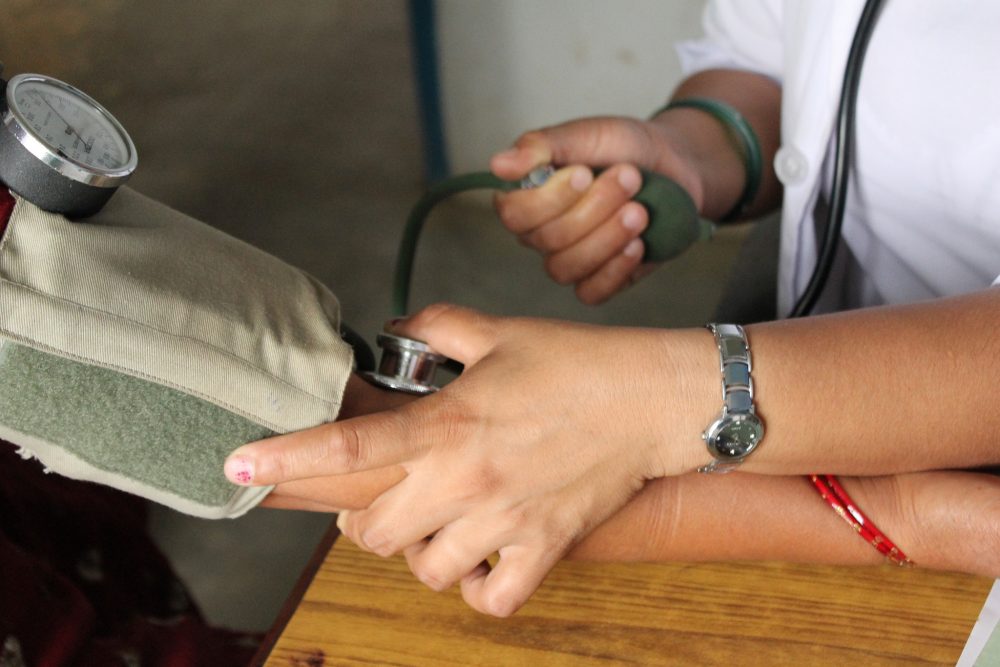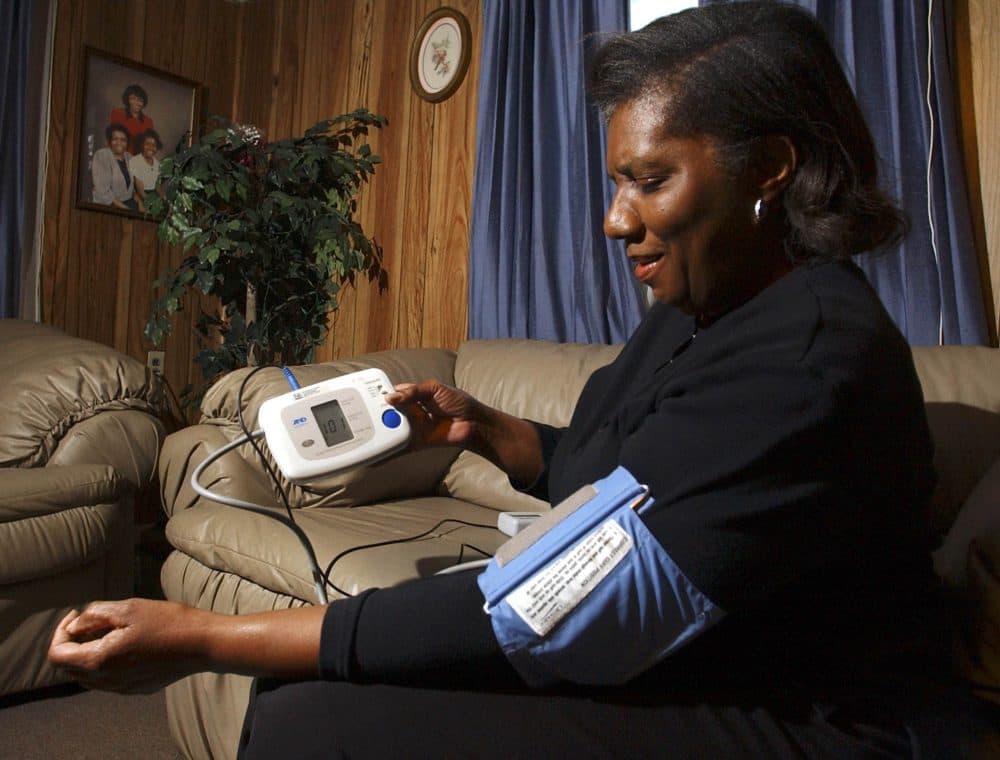Advertisement
Don't Let New Guidelines Raise Your Blood Pressure, But Do Take Them Seriously. Here's How

The American Heart Association's new guidelines on blood pressure move the goalposts for healthy levels. The short version: "Hypertension" now begins above 130 over 80, instead of 140 over 90.
With the shift announced on Monday, Dr. Harlan Krumholz of Yale writes, many people who did not have "high blood pressure" on Sunday have it now.
To help digest this disconcerting news, I spoke with Dr. George Philippides, chief of cardiology at Newton-Wellesley Hospital and immediate past president of the northeastern division of the American Heart Association:
For millions of Americans, our blood pressure hasn't changed, but how we look at it just has, from thinking of our blood pressure as OK to, "Oh, no, it's too high." What would you tell us?
I think the first thing I would tell patients is: Don't get too upset, but do take this seriously, and speak to your primary care physician about this change in designation. Shaking the public up was somewhat purposeful, because recent trials — actually many trials, but certainly some recently — have highlighted the fact that what we used to consider normal blood pressure really is not normal, and that even mild elevation is associated with higher risk of certain things like heart attack and stroke.
So the American Heart Association, in putting out these new guidelines for what is a hypertensive patient, did this purposely to get the conversation going.
Secondly, even though an extra 30 million or so folks are now going to be designated as having hypertension, of that group, only about one in five will get a recommendation that they take medications. So only a small segment of these "new hypertensives" will be recommended medications. For the other four-fifths, the only change will be a greater focus on lifestyle modification.
When you say "talk to your doctor," I imagine you mean at your next check-up, not to call them now?
Exactly. If you fall under what they now call Stage 1 hypertension — the folks who are 130 over 80 and over that — there's no urgency. You're not at risk for having a stroke or a heart attack tomorrow. We're really looking to make sure that we improve cardiovascular health over the next 20 to 30 years.
But certainly, the next time that you're going to see your physician, if your blood pressure is or has been in that stage 1 slightly hypertensive range, the next visit is the time to have that conversation.
But between now and when you do see your physician, please start thinking about ways that you can begin to change your lifestyle. So that should not wait for the next six-month visit. That should be going on every day, and should start today, in my opinion.
So if you have been thinking about making some healthy changes in your diet, getting more physically active, cutting down on the sodium and the alcohol that you're taking in, you can start doing that on your own. There are lots of great websites that can help — I think the American Heart Association does a fantastic job — and you can start working on that.
Among the lifestyle changes — diet, activity, salt, alcohol — how would you prioritize them?
I think I would first and foremost focus on the amount of sodium in your diet, because that pretty directly affects rates of blood pressure. It's been shown that lowering the sodium significantly lowers your blood pressure. So I think I would go for that first.
Second, and I feel like I'm saying this to all my patients, — not just with hypertension but with almost any cardiovascular disease — really take a look at your level of physical activity or inactivity, with an eye toward also losing weight. Over 50 percent of American adults are sedentary or near sedentary, and over 60 percent are overweight or obese. So I think those three things are what I would start with.
And what would you say to people who are among the one in five who would be recommended medication, and who would really rather not take it and may fear side effects in particular?
First of all, I think that there are many options in regards to medications, and it is not a one-size-fits-all. I think patients need to work with their physicians to come up with medicines, when they're necessary, that give them good blood pressure control and don't have side effects. And oftentimes, for full disclosure, that does require trying one or two or sometimes a third medication, until we find the right med for the specific patient.
But, I would stress that it's very, very important to take medications when the blood pressure is consistently elevated, because it's been shown in study after study to lower the risk of heart attack or stroke. Because blood pressure doesn't cause symptoms — that's why it's oftentimes called the silent killer — I think there's less urgency on the part of patients, and sometimes physicians, to get people on medications when they need it.
The problem is that over the course of many years, not treating blood pressure adequately leads to more heart attacks and strokes. Hypertension causes more deaths from heart attack and stroke than any other thing except for cigarette smoking. So my message would be while it might be difficult to get your brain around taking a medication, if your physician feels it's necessary, I would really think hard about doing it.
And what about people who say this is classic "overdiagnosis" that we changed the standards so many more people are considered hypertensive, when in fact people were doing fine before?
The fallacy in that statement is that people were not doing fine before. What studies have shown us recently is that folks who are at 130 over 80 and over do better when their blood pressures come down into the 120s. And every time that we bring in more studies — and the one that people have been citing recently is the SPRINT study from a couple of years ago — we learn more. It's natural to change our recommendations based on new studies. When we find out new things in science, we incorporate those into our recommendations for patients, and that's only proper.
So bottom-line message is: If you're freaking out a bit about these new blood pressure guidelines, that was a bit of their purpose. This is a wake-up call saying that we're redefining the blood pressure bar based on the evidence, and you may want to act on that, right?
Right. It's not just a wake-up call for patients, I think it's a wake-up call for physicians. We have all these patients who have been in the 130s and low 140s, and we thought that we were doing our best by them. We were really not. We can, and should, do better.
And that doesn't mean going directly to medication — in most folks it does not. What it really means is what we've been talking about now for many years: [It's] the mantra of, let's look at our lifestyle and how we can help patients get to a healthier cardiovascular lifestyle. That's as big a thrust as the push toward more medication.

One practical question: What's your advice for the many people who have blood-pressure measuring devices at home and might be spurred by the new guidelines to check their pressure?
Really good question, and it's actually one of the things that they talk about in these new guidelines: What is the best way to check blood pressure? The guidelines suggest that the best way to check blood pressure might not be with a blood pressure cuff one time in your doctor's office.
They actually highlight a couple of interesting things: that checking it, first of all, with an automated cuff, with one that inflates on its own, might in fact be more accurate. Many good ones are available in pharmacies, and your doctor can write you a prescription for one.
But here are some key points if you check your blood pressure at home:
• First of all, you want to take it either first thing in the morning, before your medications, or later in the afternoon before dinner, when you're at your most calm.
• And the recommendation is: Sit down at least for five minutes and chill out. Don't be fighting with your kids. Don't be on the cellphone. Don't be smoking, or watching something upsetting on Fox News. Just sit down for five minutes and relax and take it that way.
• Then, bring your blood pressure cuff in with you to your physician's office, so they can see how you're taking your blood pressure, and correlate it with their blood pressure cuff to make sure that it's accurate.
• The most recent guidelines actually highlight that blood pressure determinations at home are good, sometimes even better than blood pressures taken in the office, as long as it's done correctly, and the patient should get involved with this. There are really good, affordable cuffs out there that are very easy to use, and they store the blood pressure readings in them.
So what I have my patients do is bring in the machine, and I read their blood pressures off the machine. It's stored digitally. It's fantastic. And then I watch them take their blood pressure, make sure they're doing it right, and then we're all kind of speaking off the same script. And it also involves patients. They feel like they're part of it. They have some control over it. I really like this whole new way of going about it.
Readers? Reactions to the new recommendations, or to home monitoring?
